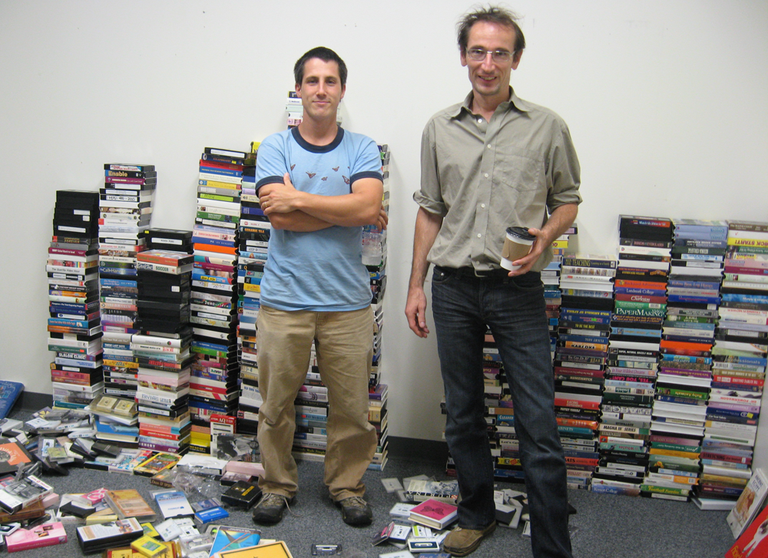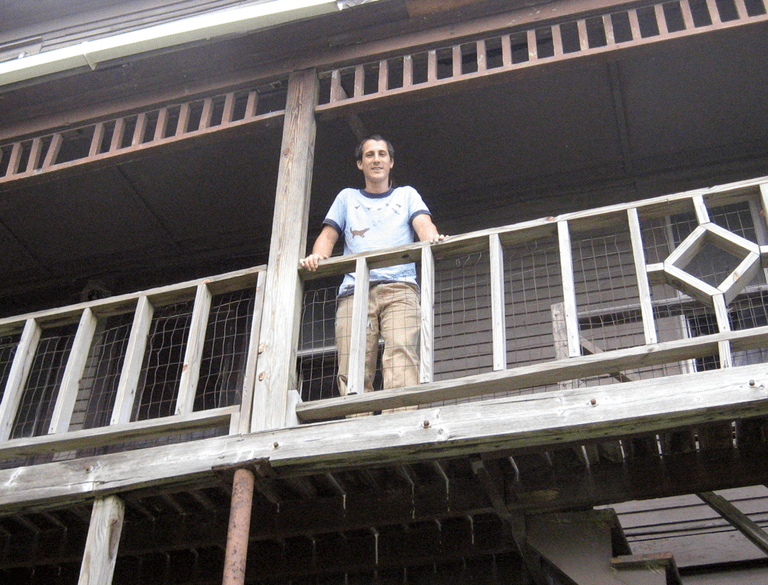Advertisement
Audio Alchemy With The Books
Resume
NORTH ADAMS, Mass. — The Books are not your usual musical duo. Yes, one half plays the cello, the other the guitar. But they’re best-known for experimenting with obscure found audio.
Paul de Jong and Nick Zammuto are on tour supporting their new release, "The Way Out." I caught up with them in North Adams, where they made one of their seminal albums, and where they still work.
But first, some history:
The Books came together 11 years ago in New York City over a common obsession: randomly discovered cassettes, LPs and videotapes. Like audio alchemists, cellist de Jong and singer-guitarist Zammuto meticulously transform voice samples, instruments, electronics and odd effects into seamless collages of sound. They're so deliciously complex it's pretty much impossible to describe:
The Books crafted their first album, "Thought for Food," remotely — talking on the phone and sending audio CDs back and forth in the mail. Both Zammuto and de Jong were traveling a lot in the early 2000s, and this was long before everyone and their mother had e-mail and Internet access.
Much of their second album, "The Lemon of Pink," was recorded and mixed in western Massachusetts. The small town of North Adams was hit hard when the Sprague Electric Factory closed in 1985, so it was cheap to live here. Zammuto, a graduate of Williams College, moved to North Adams in 2002. He offered to show me the dumpy apartment building he lived in while making "The Lemon of Pink."
On a sunny afternoon we walked up a steep hill along a crumbling, overgrown driveway with de Jong.
"So this was the building," Zammuto said, laughing. He hadn't been back in years. "As you can see it’s an absolute disaster! Look, there are squirrel holes in my apartment now, and shingles are falling off! There are probably eight apartments in this building."
Zammuto only had one neighbor. He says he labored for five months making "The Lemon of Pink," in an 8x10-foot pantry.

"A big pantry," Zammuto clarified. "So I would actually sit on an electric heater while I worked in the winter time."
Apparently solitude and tight spaces can inspire lush, thoughtful compositions. "The Lemon of Pink" is textured and detailed — and the critics loved it, including Chris Dahlen, a contributing writer for the independent music website Pitchfork.
"You’ve got these guys who are excellent sound engineers who are paying attention to the smallest details of the sonic experience," he said, "and layering in so much stuff that at the end of the day it sounds actually rather simple and sublime."
Dahlen says The Books have created a style of music that defies categorization.
“There’s no one I would really say that’s like them. You know they’re kind of sample artists, but they have the souls of folk musicians — they have such an acoustic and organic sound.”
Zammuto also writes lyrics and has a beautiful singing voice. These days he says he feels a sense of loyalty to North Adams for the time he spent here making "The Lemon of Pink."
“It was after that record we really started touring and at that point the music became a livelihood so I guess it was a good investment to live here.”
Now Zammuto lives in a beautiful farm house just over the border in Vermont. De Jong lives outside Albany. They still work long-distance, meeting about once a week in North Adams. Their office space, on the campus of the Massachusetts Museum of Contemporary Art, is overrun with stacks and chaotic piles of old video and audio cassettes. We sift through the building blocks of what The Books do.
There are tapes from evangelists and motivational speakers, including Zig Ziglar — with titles such as “Attitude Makes the Difference,” “Setting Your Goals” and “Techniques For Happier Living.”
“On this recording music specifically created for its pleasurable effects on your mind, body and emotion is mixed with a warm, orange-colored liquid.”
lyrics from 'Group Autogenics I'
Stopping on that one, de Jong said, “Oh, you see, we should’ve used that. Missed that one!”
He explained that their massive archive is not all self-help. De Jong does most of the collecting. He scours thrift stores and flea markets all over the world hunting for the most obscure, self-made productions. Self-help gurus mix with music throughout “Group Autogenics I,” the first song on The Books new CD, “The Way Out.”
“Hello, greetings and welcome,” a resonant voice intones, “Welcome to a new beginning, for this tape will serve you as a new beginning. That’s right, a new beginning, because we’re about ready to begin.”
He gently goes on to explain, “On this recording music specifically created for its pleasurable effects on your mind, body and emotion is mixed with a warm, orange-colored liquid.”
The visualization is so bizarre you can’t help but smile. You might even think of warm, orange-colored liquid later in the day after listening to these words. Or not.
Then there are the answering machine cassettes. Remember those? In “Thirty Incoming” an older man’s voice follows the now ancient “beep” of a voice message received.
“Hello Mary. I called to, um, wish you a good evening, and wish you a good rest, and tell you how much I enjoyed your company last evening. And, uh, it really felt good to lay down next to you. I didn’t realize how much I’d missed that feeling.”
It’s heartbreaking. Then it’s followed up by a driving score by The Books.
There are also some really random cassettes (like the cassettes I made as a kid with my best friend, but wish I had held onto). “A Cold Freezing Night” features what sounds like a very young brother and sister fighting. They call each other names and say things like, “I wish I was a boy,” “Why do you always get away with things? It’s not fair, it’s not fair I tell ya. I want to blow your brains out!”
"You know they’re kind of sample artists, but they have the souls of folk musicians — they have such an acoustic and organic sound.”
Music writer Chris Dahlen
Music critic Dahlen pointed to this piece when we talked, saying it really illustrates why The Books can be so provocative.
“They frame it in this really intense engaging piece of music, but when you listen to the voices it’s kind of up to you to figure out, you know, do you find it kind of funny, do you smile in recognition or do you find it horrifying these violent things kids say to each other? You know we’re kind of eaves dropping in on these two kids, but it’s kind of up to all of us to figure out what is this, what are we listening to?”
The Books generally don’t know much about the people’s voices in their songs. They rip them out of context, even if that context is unknown, but somehow make some sort of emotional sense out of them through their compositions.
But de Jong knows the origin of the found LP they used for “The Story of Hip Hop.” And both musicians agree this one is a stand-out.
“It’s a children’s record produced by the Rosicrucians,” de Jong explained, speaking of a secret order of mystics
Zammuto jumped in, “That record, I remember hearing that in the van the first time. We were going through digitized material and kind of previewing it.”
“And it’s a matter of digitizing,” de Jong picked up, “throwing out what you don’t need, and then carefully cutting words apart and completely reformulating a narrative.”
The narrative on the LP is about Hip Hop, a restless little rabbit who lives with his sister, Skip Hop, and his brother, Slide Hop.
“And I mean the unbelievable sort of cosmic yet anachronistic coincidence of that sample,” mused Zammuto. “I mean, it’s from the 50s so it predates hip hop by 20 years. We had to make a track out of it even if we had to kind of bend the rules about the kind of genre that we usually fall within, we don’t usually work with break beats.”
De Jong said the LP is incredibly rare. “I’ve never seen anything like it.” He’s not exactly sure where he found it, but he knows it wasn’t a thrift store. “I don’t really go through LPs in thrift stores because you know you have to go through like 10,000 classic rock albums to find one spoken-word album that’s usually the one you already have because it’s JFK,” he admitted, laughing about the fact that he doesn’t want to do that sort of scavenging anymore.
But de Jong says Albany, near where he lives, is one of the great, well-kept secrets in vinyl.
That’s a very small part of The Books’ story. We haven’t even gotten into what they do with video. But it is fascinating to consider why their music can be so affecting. The voice samples they choose and arrange are laced with irony, but The Books never make fun of the people. It’s all very human. Even the self-help samples manage to soothe you, while making you laugh — maybe even at yourself.
The Books are performing Thursday night at the Somerville Theatre and Friday in Northampton.
This program aired on October 20, 2010.

